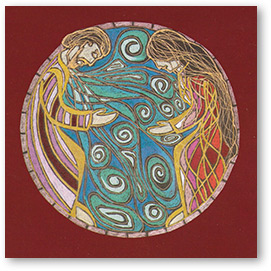Readings: Exodus 17: 3-7; Psalm 95; Romans 5: 1-2, 5-8; John 4: 5-42
 “Give me a drink.”
“Give me a drink.”
Today’s familiar Gospel story teems with themes and images to unpack and ponder: a model of encounter, a lesson in Jesus’ evangelizing strategy, a reflection on giving and receiving, a meditation on living water and fields to be harvested, a message about mutuality and discipleship. But at this moment in my life and in our nation’s story, I hear this Gospel as a powerful call to risk taking the first step.
At high noon, under the blazing desert sun, a nameless woman goes to draw water at a well. It is a famous well, dating from the time of the patriarch Jacob. She comes alone; the other women of Sychar have already come and gone in the cooler morning hours, their designated time.
But today she finds someone else at the well — a man — a Jewish man! And to add insult to injury, he has the nerve to speak to her! “Give me a drink.”
At first, she spits out her suspicion, fear, and outrage: “How can you, a Jew, ask me, a Samaritan woman, for a drink?” In other words: How dare you? We are different. My people hate yours. Your people hate mine. We use nothing in common with you, not even the water that our ancestor Jacob gave us. (No matter that Jacob is your ancestor, too.) Don’t you know that there’s been a wall between us for centuries? And besides, I’m a woman. No self-respecting man speaks to a woman in public. Etc., etc.
Jesus doesn’t back off from her angry edginess. He risks keeping the conversation going, staying with the testy encounter, seeing – hoping – where it might lead. And the woman doesn’t disappoint. She responds, questions, engages Jesus. She lets down her defenses, disregards all kinds of barriers, and so becomes a key player in leading many in her town of Sychar to follow Christ.
Scripture scholars tell us that, in truth, this story probably never happened. Rather, after the Resurrection, it was “read back into Jesus’ life-time” from the experience of the community, including Samaritan believers, that gathered around John. But that doesn’t take away from the power of the story and its message. A thirsty Jesus and a bold, searching woman could easily have kept each other at arm’s length. They could have walked away from Jacob’s well, fearing and hating each other just the way their ancestors had done for generations. Instead, they both made a different choice and took a massive risk that forever changed their world — and ours.
The writer Parker Palmer invites you and me to do the same: “Becoming people who offer hospitality to strangers requires us to open our hearts time and again to the tension created by our fear of “the other.” That is why many wisdom traditions highlight the creative possibilities of a heart broken open instead of apart. Only from such a heart can hospitality flow — toward the stranger and toward all that we find alien and unsettling.”
For your reflection:
- Re-imagine this Gospel story as told from the Samaritan woman’s perspective.
- Take the risk of starting a conversation with someone who looks, speaks, acts, thinks or worships differently from you.
–Sr. Regina Bechtle

Sr. Regina, a retreat leader, speaker, writer and spiritual director, serves as Charism Resource Director for the Sisters of Charity of New York.
Image above used with permission of the artist: Mary Polutanovich, D.C.

INSPIRATIONAL REFLECTION REGINA.THANK YOU
I love this scripture and have used it often in my ministry. You have given me “living water” to taste and feel and experience on this beautiful Sunday. I meet patients and families everyday in Hospice Ministry who are in real time “thirsty” and in the heart center thirsty for answers, hope, peace and most of all a compassionate listener …as was Jesus. Regina, thank you for this “cup of life” today.
Marion